| Portrait | Name | Term as Chief Justice | Reason for termination [3] |
|---|
| Simon of Pattishall | 1190–1214 | Died |
| Martin of Pattishall | 1217–1229 | Retired |
| Sir Thomas Moulton | 1229–1233 | Resigned to travel an Eyre circuit |
| William de Raley | 1233–1234 | Appointed Chief Justice of the King's Bench |
| Sir Thomas Moulton | 1234–1236 | Retired |
| Robert of Lexinton | 1236–1244 | Retired |
| Henry of Bath | 1245–1249 | Stripped of his position after accusations of perverting the course of justice |
| Roger of Thirkleby | 1249–1256 | Replaced |
| Henry of Bath | 1256–1258 | Retired |
| Roger of Thirkleby | 1258–1260 | Died |
| Sir Gilbert of Preston | 1260–1267 | Resigned to travel an Eyre circuit |
| Sir Martin of Littlebury | 1267–1272 | Replaced |
| Sir Gilbert of Preston | 1272–1274 | Died |
| Roger of Seaton | 1274–1278 | Retired |
| Sir Thomas Weyland | 1278–1289 | Removed from his position and exiled |
| Sir Ralph Sandwich | 1289–1290 | Resigned |
| John of Mettingham | 1290–1301 | Died |
| Sir Ralph de Hengham | 1301–1309 | Retired |
| Sir William Bereford | 1309–1326 | Died |
| Hervey de Stanton | 1326 | Not reappointed by Edward III |
| Sir William Herle | 1327–1329 | Resigned to travel an Eyre circuit |
| Sir John Stonor | 1329–1331 | Not reappointed by Edward III |
| Sir William Herle | 1331–1333 | Resigned to travel an Eyre circuit |
| Sir Henry le Scrope | 1333 | Replaced |
| Sir William Herle | 1333–1335 | Retired |
| Sir John Stonor | 1335–1341 | Removed |
| Sir Roger Hillary | 1341–1342 | Replaced |
| Sir John Stonor | 1342–1354 | Retired |
| Sir Roger Hillary | 1354–1356 | Died |
| Sir Robert Thorpe | 1356–1371 | Appointed Lord Chancellor |
| Sir William Fyncheden | 1371–1374 | Died |
| Sir Robert Bealknap | 1374–1388 | Exiled |
| Sir Robert Charleton | 1388–1395 | Died |
| William Thirning | 1396–1413 | Died |
| Richard Norton | 1413–1420 | Died |
| Sir William Babington | 1423–1436 | Retired |
| Sir John Juyn | 9 February 1436 | 20 January 1439 | Appointed Chief Justice of the King's Bench |
| John Cottesmore | 20 January 1439 | 29 August 1439† | Died |
| Sir Richard Newton | 17 September 1439 | 13 December 1448† | Died |
| Sir John Prysot | 16 January 1449 | 1461† | Died |
| Sir Robert Danby | 11 May 1461 | 1471 | Not reappointed by Edward IV |
| Sir Thomas Bryan | 1471 | 14 August 1500† | Died |
| Sir Thomas Wode | 28 October 1500 | 31 August 1502† | Died |
| Sir Thomas Frowyk | 30 September 1502 | 7 October 1506† | Died |
| Sir Robert Rede | 1506 | 7 January 1519† | Died |
| Sir John Ernley | 27 January 1519 | 22 April 1520† | Died |
| Sir Robert Brudenell | 23 April 1520 | 22 November 1530 | Retired |
| Sir Robert Norwich | 22 November 1530 | April 1535† | Died |
| Sir John Baldwin | 19 April 1535 | 24 October 1545† | Died |
 | Sir Edward Montagu | 6 November 1545 | 1553 | Retired |
| Sir Richard Morgan | September 1553 | 1554 | Removed after going insane |
 | Sir Robert Broke | 1554 | 6 September 1558† | Died |
| Sir Anthony Browne | 5 October 1558 | January 1559 | Appointed a justice of the Queen's Bench |
 | Sir James Dyer | January 1559 | 24 March 1582† | Died |
 | Sir Edmund Anderson | 2 May 1582 | 1 August 1605† | Died |
| Sir Francis Gawdy | August 1605 | 15 December 1605† | Died |
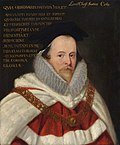 | Sir Edward Coke | 30 June 1606 | 25 October 1613 | Appointed Chief Justice of the King's Bench |
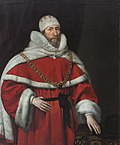 | Sir Henry Hobart, Bt | 26 November 1613 | 29 December 1625† | Died |
 | Sir Richard Hutton | December 1625 | November 1626 | Acting Chief Justice |
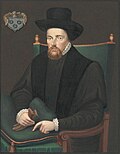 | Sir Thomas Richardson | 22 November 1626 | October 1631 | Appointed Chief Justice of the King's Bench |
 | Sir Robert Heath | October 1631 | 13 September 1634 | Dismissed |
 | Sir John Finch | 16 October 1634 | 1640 | Appointed Lord Keeper of the Great Seal |
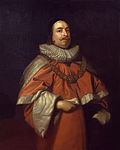 | Sir Edward Littleton | 27 January 1640 | 18 January 1641 | Appointed Lord Keeper of the Great Seal |
 | Sir John Bankes | 29 January 1641 | 28 December 1644† | Died |
 | Sir Oliver St John | 1 October 1648 | 1660 | Excluded from public office following the Restoration |
 | Sir Orlando Bridgeman, Bt | 22 October 1660 | May 1668 | Appointed Lord Keeper of the Great Seal |
 | Sir John Vaughan | 23 May 1668 | 10 December 1674† | Died |
 | Sir Francis North | 23 January 1675 | 20 December 1682 | Appointed Lord Keeper of the Great Seal |
 | Sir Francis Pemberton | January 1683 | September 1683 | Dismissed |
 | Sir Thomas Jones | 29 September 1683 | 21 April 1686 | Dismissed |
 | Sir Henry Bedingfield | 21 April 1686 | 6 February 1687† | Died |
 | Sir Robert Wright | 13 April 1687 | 18 April 1687 | Exchanged with Edward Herbert for the position of Chief Justice of the King's Bench |
| Sir Edward Herbert | 18 April 1687 | 1689 | Dismissed after fleeing to Ireland with James II |
 | Sir Henry Pollexfen | 6 May 1689 | 15 June 1691† | Died |
 | Sir George Treby | 30 April 1692 | 13 December 1700† | Died |
 | Sir Thomas Trevor
(Lord Trevor from 1712) | 5 July 1701 | 14 October 1714 | Not reappointed by George I |
 | Sir Peter King | 27 October 1714 | 1 June 1725 | Appointed Lord Chancellor |
 | Sir Robert Eyre | 1725 | 28 December 1735† | Died |
 | Sir Thomas Reeve | 26 January 1736 | 19 January 1737† | Died |
 | Sir John Willes | 28 January 1737 | 15 December 1761† | Died |
 | Sir Charles Pratt
(Lord Camden from 1765) | January 1762 | 30 July 1766 | Appointed Lord Chancellor |
 | Sir John Eardley Wilmot | 20 August 1766 | 26 January 1771 | Resigned |
| Sir William de Grey | January 1771 | June 1780 | Resigned |
 | The Lord Loughborough | June 1780 | 28 January 1793 | Appointed Lord Keeper of the Great Seal |
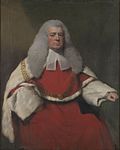 | Sir James Eyre | 11 February 1793 | 1 July 1799† | Died |
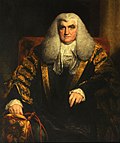 | The Lord Eldon | 17 July 1799 | 1801 | Appointed Lord Chancellor |
 | The Lord Alvanley | 22 May 1801 | 19 March 1804† | Died |
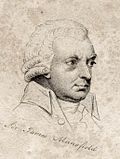 | Sir James Mansfield | 24 April 1804 | 21 February 1814 | Resigned |
 | Sir Vicary Gibbs | February 1814 | November 1818 | Resigned |
| Sir Robert Dallas | November 1818 | 1824 | Retired |
 | The Lord Gifford | 9 January 1824 | 5 April 1824 | Appointed Master of the Rolls |
 | Sir William Best | 15 April 1824 | June 1829 | Retired |
 | Sir Nicholas Conyngham Tindal | 9 June 1829 | 6 July 1846† | Died |
 | Sir Thomas Wilde | 6 July 1846 | 15 July 1850 | Appointed Lord Chancellor |
 | Sir John Jervis | 16 July 1850 | 1 November 1856† | Died |
 | Sir Alexander Cockburn, Bt | November 1856 | 24 June 1859 | Appointed Chief Justice of the Queen's Bench |
 | Sir William Erle | June 1859 | November 1866 | Retired |
 | Sir William Bovill | November 1866 | 1 November 1873† | Died |
 | Sir John Coleridge
(Lord Coleridge from 1874) | November 1873 | 20 November 1880 | Court merged with the Court of Queen's Bench and the Exchequer of Pleas; became the first Lord Chief Justice of a unified Queen's Bench Division. [2] |












































